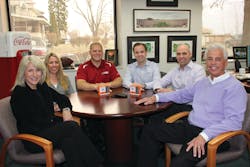Investing in vending technology can be expensive and intimidating. There is never a guarantee that the investment will bring better margins, but in 2008, All Star Services took a technological leap of faith and hasn’t looked back. Technology has allowed this 19-route operation to combine its four-location operation inventories, reduce costs by cutting down on the number of routes and witness better sales from cashless installation. Jeff Smith, president and owner of All Star Services, and Duncan Smith, vice president of operations, believe that the company’s investment in technology has allowed them to become more efficient and focus on the consumer experience at the point-of-sale.
Sales and acquisitions
Jeff Smith never dreamed as a kid that he would end up as the president of a vending operation. From 1977 to 1987 he worked for the Coca-Cola Co., holding a variety of positions and relocating with his wife, Suzanne, seven times over a ten-year period. During that time, Smith’s father-in-law owned Coca-Cola Bottling which operated a vending division called All Star Vending Services in Port Huron, Mich. In 1985, Suzanne’s father sold the Coca-Cola franchise to focus solely on vending. Smith and Suzanne moved back to the Midwest in 1987 to work at the family vending business. Overtime, the Smiths bought out family and gained 100 percent of All Star Services’ vending, office coffee and foodservice business.
Over the next 27 years, the company made six acquisitions in order to gain territory and additional business. Because of the growth in 2001, All Star Services added a third location in the Metro Detroit market. And later, after several other acquisitions, in 2006 added a fourth location in Saginaw. To date, All Star Services operates throughout Southeast and Mid-Michigan in 23 counties with four service locations.
Sales and acquisitions are a large part of the company’s business strategy, and Smith noted that if there were to be an opportunity for additional acquisitions, the company would be interested in discussions. However, Smith’s largest concern with acquisitions nowadays is the other company’s technology. When considering a sale, Smith gauges the investment needed to bring the other company’s machine onto All Star Services’ system. “We will always ask what system the other company is on now and what types of machine models they have,” said Smith. “We realize that some machines may be too old to wire into technology.”
Although technology is now a large part of what makes All Star Services so successful, that wasn’t always the case.
From family level to DEX
From 1987 to 2006, All Star Services was running on product family level with data entry from route cards. The company knew it was selling a certain amount of chips and candy, but it did not know specifically how much of each brand it was selling. Route drivers were overstocking machines, each truck was a rolling warehouse and it would take days for inventory information to reach the office. Business was maintaining, but the company hadn’t realized the amount of inefficiencies until 2006, when Smith’s son, Duncan began working for All Star Services.
Third generation, new perspective
Duncan Smith, vice president of operations, had worked at the family business at a young age refurbishing equipment and doing odds and ends around the office. When Duncan began officially working for the company, he recalls little to no technological integration in the office or on the routes. “We knew what we were buying, but we didn’t know where we were selling it,” he said. When Duncan — and his other siblings, Devin and Caroline, shortly after — began working for the company, Jeff admits that the addition jumpstarted the business’s technology investment. “With my children coming in to the company it was time for us to look towards the future and how we were going to integrate technology,” recalled Jeff Smith. “The younger people today bring the energy and technology into the business that was so greatly needed. Before my kids became active in the company, we weren’t moving as rapidly into the technological side. They forced us to look beyond today and towards tomorrow.”
In 2008, a year and half after Duncan’s arrival, the company invested in its first vending management software (VMS) with Crane Streamware. They put the route drivers on handhelds with full DEX on machines. The company was now able to track item level sales by machine.
Route drivers began to see how the new use of technology would aid them in the short and long haul. “When you make change, you’ll always discover resistance along the way. But we were able to get through that over time,” said Jeff Smith. “Overall you have to step back and look at the entire system and what is working.” The company found that the employee whom they thought would be most resistant to the technology turned out to be the most receptive.
Prekitting
Once All Star Services began using DEX, it wasn’t long before the company sought other ways in which to use technology in the office and the warehouse. Soon after its VMS integration, All Star Services began using Cantaloupe Systems’ Seed device for scheduling and routing and Lightspeed Automation in 2009 for prekitting. “I saw integrating technology a must, and Cantaloupe helped us get there,” said Duncan Smith. The staff was able to efficiently use Cantaloupe’s Seed device to gain daily online reports of sales data, power losses and machine issues. This new information allowed All Star Services to begin prekitting, as the company knew exactly which items consumers were purchasing. “I saw prekitting with lights as a necessity from the start,” explained Duncan. “It takes about one third the time, maybe even less than that to pick from lights versus picking from paper. I wouldn’t be able to pick all of our routes without lights. So that was an investment we saw that was a must to make the switch to prekitting.”
Due to prekitting, volume went up on a per-route level and drivers were servicing fewer machines per day. The company was also able to use smaller trucks, translating into less fueling costs. Automating the processes allowed the inventory from All Star Services’ four locations to be combined to a centralized warehouse.
Duncan credits the company’s technological integrations with the patience and vision of the employees and management team. “We wouldn’t be able to make changes without the support of our entire staff,” said Duncan. “Technology is a huge time and financial investment and everyone works hard to make sure it’s an investment that’s right for us.”
With investment comes return
All Star Services is still investing in technology. In February 2014, the company made the transition to Cantaloupe Seed Office and Seed Mobile. “I sought out Cantaloupe because I wanted a one-stop-shop,” Duncan said. “Much like how I want our customers to think of us as their one-stop-shop, we needed something similar for our telemetry, inventory and routing.”
With the Seed Mobile system, the drivers use an iPhone, iPad or iPod Touch for handhelds and physical DEXing at the machine is no longer part of the vending process. As all inventory changes are automatically updated in the Seed Office cloud, the staff can see real time, instant inventory adjustments, which makes scheduling of machines and routes significantly easier. “All of our drivers see the benefits of having real-time data,” said Duncan. “They can make inventory changes today and get correct product tomorrow, where in the past we wouldn’t know of inventory adjustments until the following day. It’s easier for the office staff as well for merchandising and scheduling. We all see the importance of real-time inventory adjustments.”
Adding telemetry and prekitting has allowed the company to save money in the form of cutting back routes. “If we were operating under the same system we were when I came in, we would have twenty-seven routes,” said Duncan. “Now, we are only going to machines that need to be serviced.”
Smith likes the fact that the company is now able to share item level sales data with clients, specifically human resource departments, on what sells from the machine in their breakrooms. This data also helps the company merchandise machines to an individual location’s purchasing habits and trends.
Returns have been high from all of the investments the company has made in technology. “The company has seen sales increases from better merchandising, sales increases from less out of stock products, reduced costs from not having as many routes on the road, less overhead from having fewer vehicles on the road and reduction in costs from not wasting drivers’ time,” said Duncan. “As a company we have seen increased productivity and quality of work from our drivers because they are more efficient and are being paid better.”
When they switched systems they were able to eliminate 30 percent of their routes. “Our drivers are doing 50 percent more dollar volume and going to an equal amount of machines, if not less per day,” said Duncan.
Cashless as another option
All Star Services didn’t just invest in operations, but also in ways that benefited the consumer. After Duncan and his siblings joined the business, they made it known that consumers have multiple methods of payment and that the company needed to begin looking at all of the possible ways they could appeal to that consumer. One solution was to offer cashless. “I don’t carry cash,” said Duncan. “The younger generation doesn’t carry cash and we needed to offer the methods of payment that caters to them.”
The company has seen as much as 30 percent sales increase in locations just by adding card readers. “On average we have had 12 to 15 percent sales increase after installing cashless,” said Duncan. About 50 percent of the company’s machines are cashless, but its goal is to have 100 percent cashless within the next couple years.
Micro markets boost fresh food sales
The ability to offer a wider selection of products to consumers drew All Star Services into micro markets in 2011. “The vending business was stagnant,” said Duncan. “Micro markets give us the opportunity to sell more SKUs, more goods and really become more retail oriented. Today we want give our customer more choices.” Duncan has noticed that micro markets drastically increased sales, twenty to twenty five percent, in locations that were previously traditional vending.
Additionally, fresh food sales have grown from 8 or 9 percent of total sales to over double that. “Micro markets diversify our company,” said Duncan. “We aren’t restricted to the size or shape of an item, like in vending.” He credits the company’s integration of technology and promotions with the success of its micro markets. For example, directly after the New Year, All Star Services offered discounts on bundled ‘healthy’ items such as Baked Lays and bottled water. And when Major League Baseball (MLB) Opening Day started in March, they ran a promotion on corndogs, peanuts and Cracker Jacks.
The future
Although there are many uncertainties in the vending industry, the Smiths are optimistic about the future of All Star Services. “The industry veterans within the company are bit more conservative, while us younger folks are more willing to take risks,” said Duncan. “We make a good balance.” As one of those risks, technology has helped All Star Services increase its profits, cut down on costs and look forward to the next innovation.
Think global, act local
Giving back to the community is an integral part of All Star Services. Over the last several years the company has been involved in making annual contributions and doing fundraising for the Girl Scouts of America, the Boy Scouts of America, the United Way and most recently, the March of Dimes. The company encourages employee participation in local and regional community service. Additionally, the company sponsors local youth hockey teams and contributes food donations to the Mid-City Nutrition Food Bank in Port Huron, Mich. To lead by example, Jeff Smith serves on the City of Port Huron Planning Commission and the St. Joseph Mercy Hospital Board where he holds the position of chairman.
Retail-oriented loyalty promotions enhance offerings
The team at All Star Services found that they had higher success when they could offer promotions to consumers.
“The more you promote, the more interest you create for the customer,” said Duncan Smith, vice president of operations. All Star Services found that adopting technology would be a large part of how they could offer these promotions to consumers. “Telemetry and cashless, coupled with the USConnect loyalty rewards program, has allowed us to offer promotions to the customer that are similar to retail,” he continued.
As an original member of USConnect, All Star Services believes that the consortium’s mission of providing quality fresh foods, healthy choices in the workplace, eco-friendly equipment and an integrated network managed through industry-leading technology was exactly in line with its business model. With USConnect, the company began using current and trending events as promotional platforms.
Consumers can use their USConnect card at vending machines or kiosks and build points for every dollar they spend. Although the cards are physical right now, Duncan sees the USConnect card becoming mobile in future, in order to adapt to consumer preferences.
Profile All Star Services
Founded: 1963
Owner: Jeff and Suzanne Smith
Headquarters: Port Huron, Mich.
Number of employees: 59
Number of routes: 16 vending, 3 OCS
Number of micro market locations: 15
Software provider: Cantaloupe

Adrienne Klein | Contributing Editor
Adrienne Zimmer Klein is a freelance writer with a background in the vending, micro market and office coffee service industry. She worked as an associate editor and managing editor at Automatic Merchandiser and VendingMarketWatch.com from 2013 until 2017. She is a regular contributing writer at Automatic Merchandiser.







